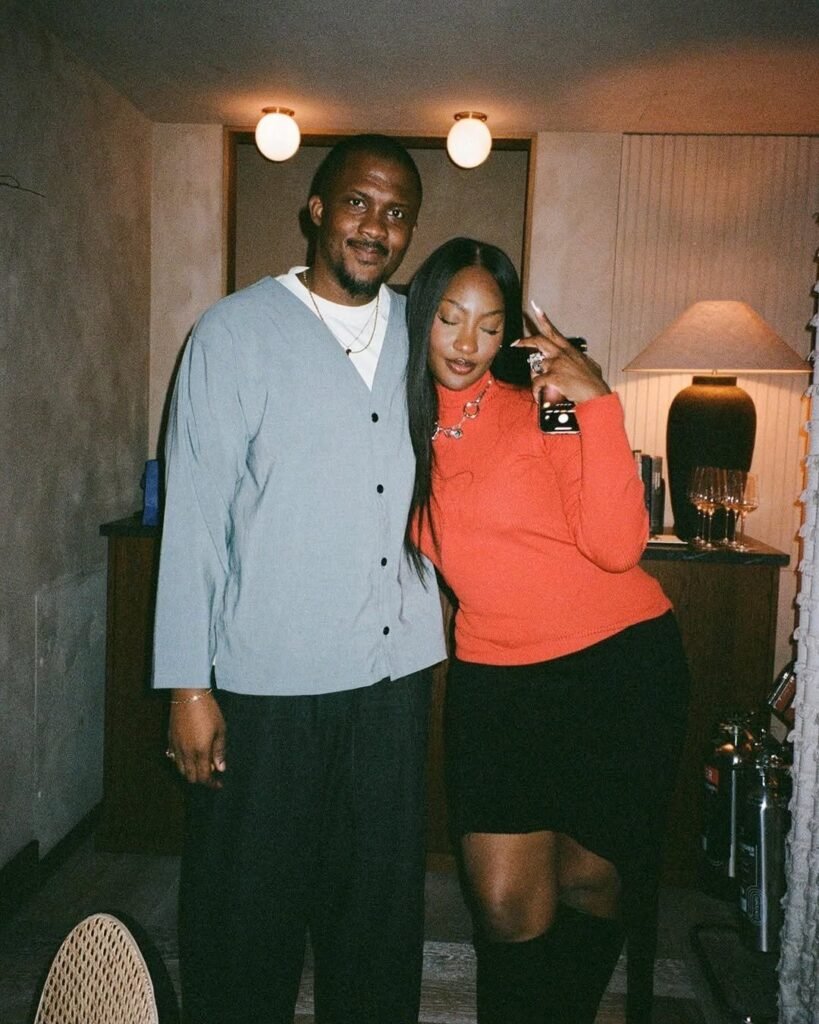When Tems burst onto the Nigerian music scene with the riveting single Try Me, not many could have envisaged the explosive rise that would follow. But once she lent her transcendent vocals to Wizkid’s groundbreaking smash hit Essence, everything changed. She didn’t just break out; she took off like a SpaceX Falcon 9 rocket, quickly becoming one of the most recognisable and in-demand voices in global music.
Within a relatively short period of time, she has achieved unprecedented success both critically and commercially; she has sold out major venues like The Eventim Apollo in London, L’Olympia in France and Radio City Music Hall in New York City. She has won multiple Grammys, earned an Oscar nomination and has become one of Africa’s biggest musical exports, all while maintaining the quality and depth her music has carried since day one.
Before she became Tems, the superstar, she was Temilade Openiyi. The “special baby” her mother believed in even before her birth. “God told me,” her mother says in Temilade Interlude, “This is a girl, and her name is Témìládè… don’t forget the name I told you.” In those spoken words, layered over ambient chords, she shares her origin story and the early sense of purpose that would come to define Tems.
tems wins best african music performance category with "love me jeje" #GRAMMYs pic.twitter.com/Jh269SwNKP
— the.v𝐢be (@thejpgvibe) February 2, 2025
From an early age, she discovered her singing voice. At 11, Temilade joined her school choir, where she began experimenting with falsetto, catching the attention of her music teacher Mr Sosan, who recognised her potential and helped her train her voice while teaching her how to play the piano. “I’ve never seen someone so talented at such a young age. She sings from the heart, and her voice is special. When I see her now on TV or hear her on the radio, I’m so proud of her, but I knew it was bound to happen sooner or later. 120%, I knew she was destined for great things,” he told Nativemag in 2020.
At home, she practised constantly, often singing alongside her brother, who played the guitar. Despite having the kind of talent that could attract people, she kept to herself. In her own words during an interview with Korty EO, she described herself as “shy” and someone who “sheltered herself from the world”. She kept a small circle and had “like one friend in every class”. One aspect of her personality that still hasn’t changed. “I have very few friends,” she told Korty.
So, how did this quiet, introverted girl go from singing in private to becoming a global superstar? After completing her university education at Monash South Africa, where she earned a degree in economics, she landed a job in digital marketing, a job that left her unfulfilled. “I just couldn’t believe that was my job,” she told Korty as she explained the frustrations that made the job unsatisfying. “I just used to think people didn’t like me; gosh, I was upset all the time.
It was this internal discomfort that pushed her to quit the job and pursue a music career. A decision that didn’t appeal to most of her family members. “When I said, Oh yeah, I’m quitting my job; I’m going to sing now, everybody was like, She’s on drugs; she’s smoking,” she told the Breakfast Club.
With very little support, she leapt to pursue music full time. Armed with music production skills she had self-developed during her time in university through watching videos on YouTube, she began building her sound from scratch. Her official debut came in 2018 with Mr Rebel, a slow-burning single that introduced Tems not just as a singer but as the leading vibe. The record didn’t scream for attention; it drew you in quietly. With minimalistic instrumentation that relied on haunting harmonies that carried significant emotional intensity, Tems offered her early listeners a glimpse of her unique voice type and her brilliantly expressive pen.
Mr Rebel brought Tems into public consciousness. It wasn’t just prospective fans who took notice—the industry did too. “I met my two managers, Wale and Muyiwa, after I dropped my first song. Radio started taking note. I started realising, Oh, God is making a way somehow,” she told The Breakfast Club. For a young, independent female artist, navigating the Nigerian music industry could have been a gargantuan task. But alongside Muyiwa Awoniyi—who had already experienced great success with Nonso Amadi—and Wale Davies, one half of the legendary Show Dem Camp, Tems moved with clarity and intention.


With Tems, every step feels like a step forward in the right direction. There’s an intentionality to the way she moves and the timing of what she does that makes nothing about her journey feel accidental, despite how sudden her success seems from the outside looking in. She only needed three singles in Mr Rebel, Looku Looku, and Try Me to capture listener attention and retain it.
With Mr Rebel launching her career into orbit, Looku Looku cemented her place as one of Nigeria’s most exciting new talents at the time. Released in early 2019, she calls out male promiscuity floating over gentle harmonies and soothing piano chords. Music executive Motolani Alake describes the song, in his 2020 review of her debut EP, as a beautiful song that doesn’t get what it deserves, alluding to the fact that it’s probably her most underrated single yet. While the song, despite its extraordinary quality and depth, didn’t receive the attention and acclaim it deserved, it deepened the connection with her early listeners while serving as a lay-up to Try Me, the emphatic smash hit that would finally put Tems on everyone’s radar and command the recognition that her talent deserved.
The fiery anthem propelled Tems from promising newcomer to national sensation. On the record, she channels her rage and frustrations with suppressive systems attempting to bring her down. “Now you want to lock me away, I’m winning. You want to add to my pain, I’m shining,” she sings over the booming instrumental. The song reflected a phase in her life where her internal frustrations with her immediate environment overwhelmed her. In her interview with Korty, she talks about “being upset all the time.” She recalled moments when she’d step out of her car barefoot in traffic, yelling at strangers. “You are very stupid,” she’d shout in bursts of rage. While she chose to deal with it by keeping to herself, as the interview revealed, she embraced a different approach on Try Me; she fights back. “So I woke up in the night / Broke out of my chains,” she sings, painting pictures of escape from bondage before asserting her power, singing. “There’s a fire in the sky; it’s burning, and I’m always going to keep running.”
With Try Me, Tems emphatically announced herself. The fiery single made it clear her early successes weren’t a fluke. Within 18 months, she had rapidly climbed the ranks of Nigerian music and established herself as a formidable voice in Nigerian music. The song also arrived at a moment when a new vanguard of Afropop stars was emerging. Artists like Rema, Fireboy DML, and Joeboy are each making waves with breakout hits like Dumebi, Jealous, and Baby. While Tems didn’t have a mass-market continent-conquering smash on that level, her raw and distinctive talent and unapologetic presence ensured that her name stood shoulder to shoulder with her peers.
Tems swinging her waist like we never did see¿🌚 pic.twitter.com/I7hjfC5yDE
— Cheeoma🌸 (@cheeooma) August 5, 2025
To sustain her momentum, she released her debut EP, For Broken Ears, a glowing showcase of her well-rounded artistry. Producing 90% of the project, Tems displayed the best of her artistic abilities as she delivered lucid storytelling that cut across themes of loss, love, success, regret and longing, with her voice serving as succour to the broken.
At the centre of it all was Damages, a breezy yet emotionally firm track that saw Tems demanding better treatment in a relationship. The single arrived a few weeks before the explosive #EndSARS protests, where young Nigerians took to the streets to demand better treatment from the oppressive government of the day.
With its mid-tempo bounce and infectious hook, the song was a commercial success that continued her phenomenal run and helped introduce her to a much wider international audience. Overall, the EP, For Broken Ears, continued to elevate her profile and attract attention from music fans and fellow artists alike, one of whom was none other than Afrobeats megastar Wizkid.
In 2019, Wizkid expressed his admiration for Tems’s talent to long-time collaborators Legendury Beatz and expressed his interest in working with her, as revealed in a Pulse Ng profile of the highly impactful and successful production duo. She would confirm this in an appearance on Bigboy TV. “I just heard, Oh, he wants to meet me, and then I met him in that year, 2019; we recorded Essence 2019, and it came out in 2020,” she told Bigboy. Released as part of Wizkid’s groundbreaking 2020 LP Made in Lagos, the record was a cultural phenomenon. The song went from a slow-burning album deep cut to a global song of the summer, racking up numbers and eliciting wild fan reactions at festivals across the globe. The record made history, becoming the first Nigerian song to crack the Billboard Hot 100, debuting at number 82.
The song earned a remix from Justin Bieber, whose addition to the song introduced it to a much wider audience and propelled the record to the Top 10 of the Hot 100 chart. As of the time of writing, the song has been certified 5x platinum in the United States and 2x platinum in Nigeria, garnered over 100 million views on YouTube, earned a Grammy nomination in the process and continues to be celebrated as the defining record of the Afrobeats-to-the-world era.
And Tems wasn’t just a guest artist on the song; she was the essence of the song. Her unforgettable performance on Essence ensured she became one of the most in-demand voices in music. Within months of Essence going global, she landed collaborations with some of the biggest names in music. Drake tapped her for Fountains on his 2021 album Certified Lover Boy.
In 2022, Future would also enlist her vocals by sampling her song Higher for his anthem Wait For U, featuring Drake. The song was a massive success, debuting at No. 1 on the Billboard Hot 100 and eventually earning Tems a Grammy Award for Best Melodic Rap Performance as she became the first female artist from the Nigerian music industry to win a Grammy Award. She also became the third Nigerian woman to win a Grammy, following Sade Adu, who won for Best New Artist in 1986, and Cynthia Erivo, who won in 2017 for Best Theatre Album.
She also landed remarkable achievements, including winning a BET Award, earning an Oscar nomination for co-writing Rihanna’s Lift Me Up on the Black Panther: Wakanda Forever soundtrack, a cover on The Cut, and sold-out shows across the globe, all before the release of her debut album.
By the time she was ready to release her debut album, Tems was already a megastar. The album arrived almost three years after dazzling her way into the consciousness of a global mainstream audience with Essence. She spent significant time working on the album, resisting the pressure to capitalise on hype and give in to fever-pitched fan demands for an album. Another example of the intentionality and precision that she has moved with at every chapter of her career.
And when the album arrived, the time and thoughtfulness invested in its creation and curation were evident in its immense quality. The album shone brightly, carrying the weight of an artist who had taken the time to reflect, introspect, find her voice and create on her own terms.
The album displayed her undeniable artistry, with her spellbinding prowess holding listeners down across 18 tracks that reflected her thoughts, feelings and person. The album was a potpourri of sounds as she explored Afrobeats, jazz, dancehall, and hip-hop by way of R&B, canvassing a range of topics that cut across personal growth, healing, pressure, romance, spirituality, and faith.
Tems has never fit the mould; she has never tried to. From the beginning, her music sidestepped the tropes that defined mainstream Nigerian music. She explored unconventional soundscapes and rightfully ignored “advice” from industry professionals to tweak her approach to succeed within the Nigerian music climate. Where the industry pushed hypervisibility, she moved with restraint, mystique and intentionality. Her rise isn’t just a triumph of exceptional talent; it’s proof that there’s a place and a need for artists who choose to do things differently.
Her commitment to distinctiveness is embodied in The Leading Vibe, not just as a brand name but as a blueprint. Her manager, Muyiwa Awoniyi, said on Joey Akan’s Afrobeats Intelligence podcast, “If you can predict it, we’re not doing it”—a statement that holds across every chapter of Tems’ journey. Whether it’s partnering with Aston Martin or resisting industry pressure to dilute her sound for commercial appeal, Tems has remained staunchly true to herself.
Today, Tems stands not just as a global superstar but as a symbol of artistic independence and self-determined success. She is the blueprint for artists who want to be introspective, experimental, and emotionally raw. Her music speaks to those who have felt invisible, misunderstood, or unheard. And in doing so, she’s become more than just a musician. She’s become a movement.
Tems ascended on her own terms. And in a world where it’s easier to follow the formula, her refusal to conform is what truly makes her the leading vibe. She’s the “special baby” her mother believed in even before her birth. There is absolutely nothing like Tems.

















